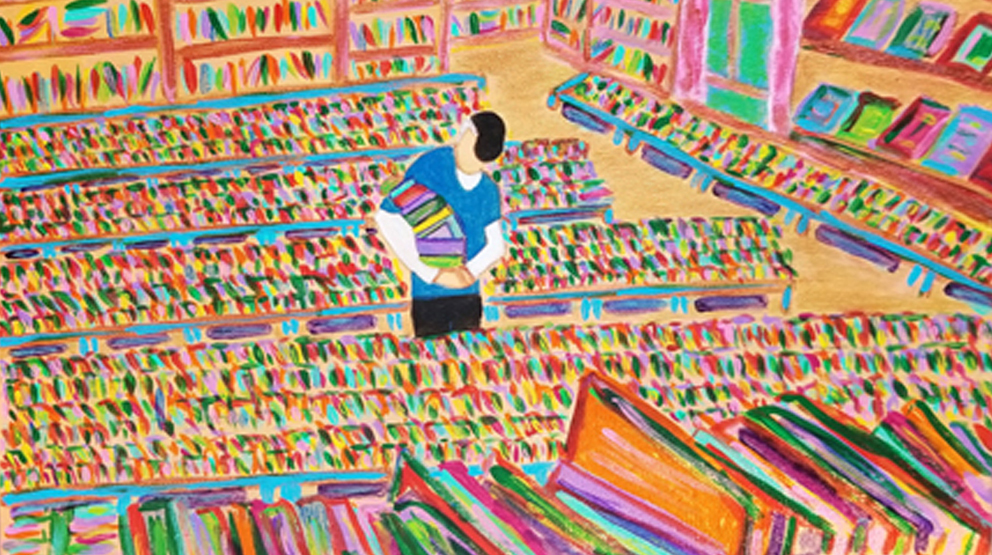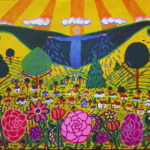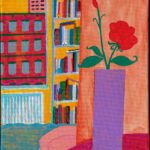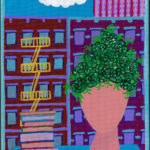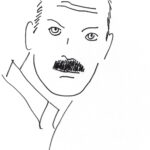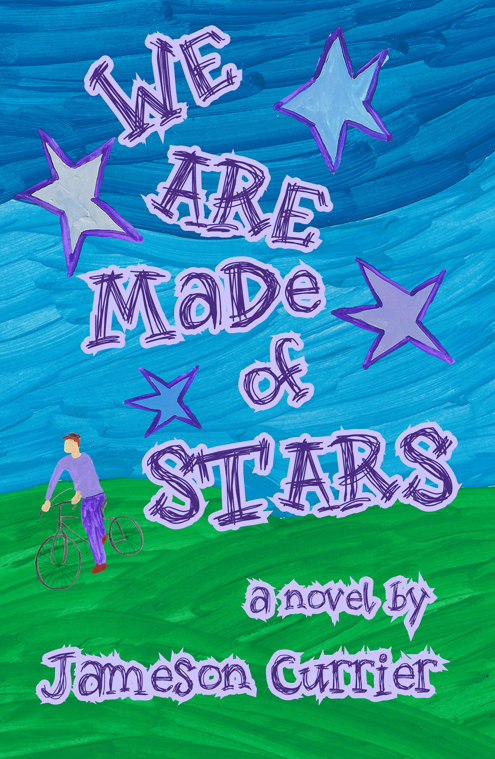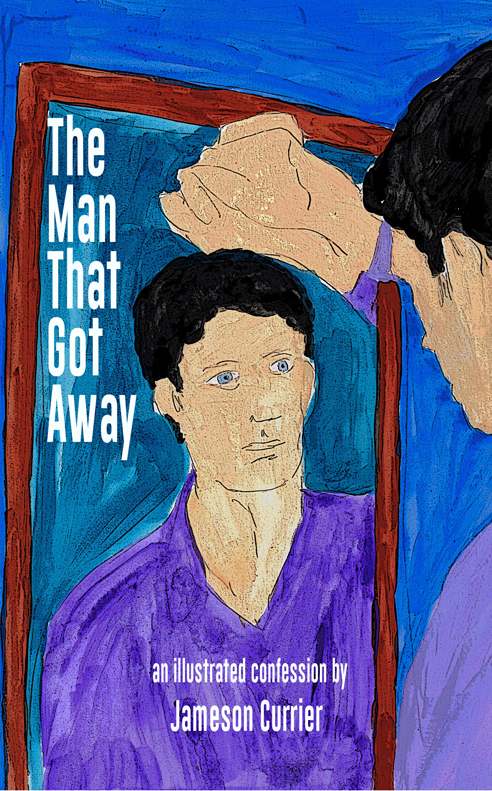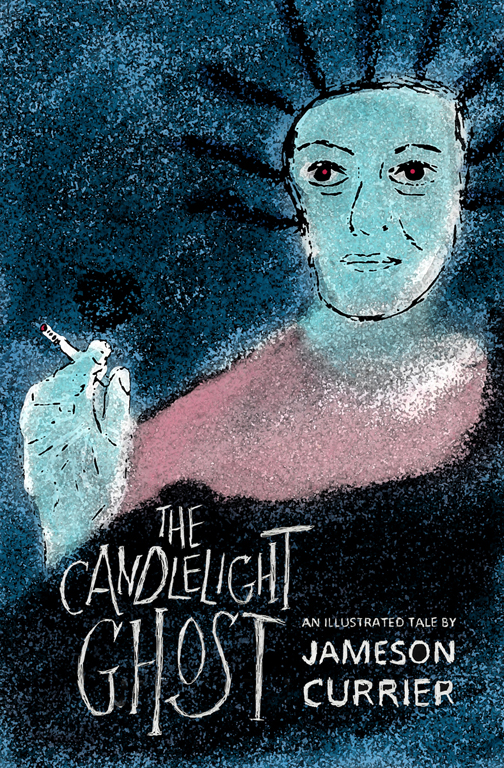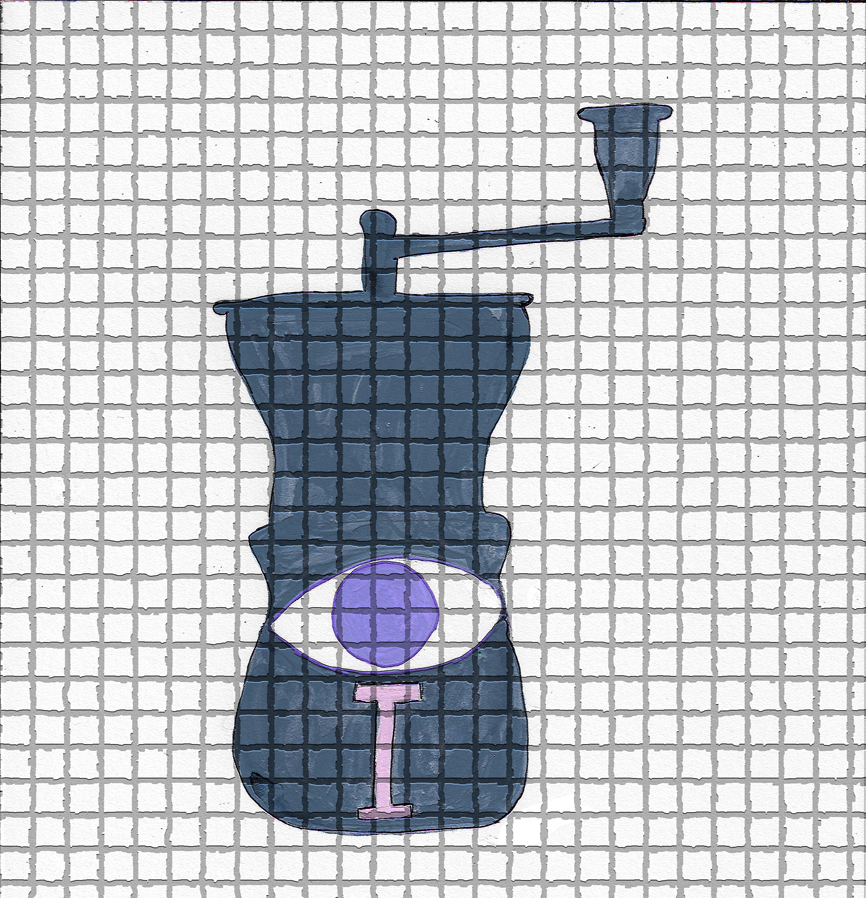
illustration by Jameson Currier
THE BLIND POET
by Jameson Currier
I have been reprimanded by a poet I have published several times because I asked him to stop sending me his poems the moment he completes them. I have known this poet more than twenty years, since the mid-1990s when we both contributed to a magazine focusing on individuals with HIV. To be frank, I don’t remember him from those days; I don’t think we ever met, we only shared our names on the masthead of the magazine we both contributed to, but he seems to remember me fondly from those days or so I learned when he reintroduced himself by sending me a package of his poems that arrived one day by snail mail after I had become a publisher who published printed books. I became a publisher to publish printed books by lost or overlooked gay voices, particularly my own, so when this particular poet, a gay man who has HIV and who writes poems about his life with HIV, began sending me typed copies of his poems in the mail delivered by the US post office, I began to read and consider publishing him. One drawback, of course, in the electronic digital age is that because he would snail mail me his poems I would have to scan or retype them myself into a word processing program if I wanted to publish them, which is something that didn’t annoy me at first because I thought I was helping an under heard voice be more represented and find an audience—but as more and more of his poems arrived—it began to annoy me that I had to retype them if I wanted to publish them since every other gay male poet in the known universe was sending me poems electronically—as attachments to emails, embedded into emails, as texts and inside instant messages—and if they weren’t sending me their poems electronically then they were checking on whether I had received their poems electronically and emailing whether I was going to publish their poems or if I was going to publish their poems, how soon was I going to publish their poems. Now I should probably admit that I have written several poems myself though I have never admitted or introduced myself as a poet, nor read one of my poems in public to mark a special occasion or as a special remembrance, reciting words in funny high or low or loud or soft voices and using hand gestures to emphasize the rhythm of syllables, though I will admit that when I was teenager and the editor of my high school yearbook I did alter several lyrics to Karen Carpenter songs to turn them into optimistic phrases we might one day remember when we became older. But today at the age of greater than sixty I’m grateful I grew out of that phase and I’ve now come to resent and cringe and roll my eyes when a gay man introduces himself as a poet. To me it has become a moniker for narcissism, self-absorption, vanity, egotism, and conceit, and an open invitation for anyone to applaud the person labeled “poet” whether or not the poet is even any good at writing poetry, even if the poet is writing poems about Abraham Lincoln sleeping in a bed with another man or the horrific death of Matthew Shepard that are awful. My experience with poets, earned the hard way through the school of hard knocks, has made me realize that “poet” is the self-selected label of an egotist, a person who desires claps and laughs and giggles and intake of gasps in response for being in love with himself while over pronouncing words or suggesting meanings that may or may not be obvious or possibly irrelevant when you deconstruct the egotism. And the thing about “gay male poets” is that they bond and band together, as though they were forming a cult, reciting syllables in strange sounding voices and waving and gesturing their hands in public whenever they can get an invitation to do so, though they will each stab each other in the back and criticize and mock each other the first opportunity they can, though never in print, never in publications because that would be to deny the existence of the very essence of what keeps them alive—the beauty and essence and breath and vitality of poems and words that form rhythms and rhymes and are intended to provide laughs and leaps of insight into the joys and sorrows of life. So by the time the gay male poet with HIV began sending me through the USPS snail mail clippings and entire magazines that featured his self-reflective poems or interviews about him writing his self-reflective poems (and including copies of his previously published poetry collections in these packages), I was besieged by other gay male poets too, each with special needs. There was one gay male poet who was adamant that if I published his poem it must retain a single blank space at the beginning of every line of his poem, so much so that he had a fellow gay poet reiterate the point (and blank space) to me, and all I could do was roll my eyes and think, well, how does he do that blank space when he performs his poem before an enraptured crowd of other gay male poets? Does he intake a short breath or let out a sigh or is it revealed by the quick wave of a hand? But then there was poet who pulled his work from a collection of gay male poets that I was working on publishing because the software I was using accidentally broke the lines of his poems in the wrong place and he couldn’t wait a day for me to learn the code to correct it. There was also a poet who sent me a poem that was a repetition of one foul word, as if the foul word repeated and repeated and strung together, line after line after line, created some kind of art form that had never existed before and that I would think was the mark of an undiscovered genius. And then there was a poet who sent me a poem that was only a title, with nothing but blank space and his name at the end of the blank page and all I could think was that he had made a mistake, or why would I want to publish a blank sheet of paper with only the title and the name of the poet, and instead of a light bulb bursting into brightness above my own head at the ingenuity of it, my eyes squinted in disbelief and my own voice turned high and I thought, Really? Really? But I published each of these poets, kindly asking them for other submissions, patiently waiting for a poem from them that I might understand and reflect a moment of the life of a gay man who might not be as narcissistic and vain as he really is, and to my shock and horror when I accepted these poems from gay male poets their only acknowledgement of that acceptance was a fleeting Happy Dance post on Facebook or Twitter or Instagram, only to be able to bathe in the congratulatory joys of hundreds of “Likes” by the friends or faux friends or other members of the gay male poetry cults as if they had just read their poem in an auditorium with a standing room only crowd. Each and every one of these poets would not buy a copy of the collection I had published that featured their poem and that had cost me a lot of time and money to do so. One gay male poet with a particularly high-toned speaking voice who was included in a collection of poems I published even gave the collection three stars on Goodreads, as if he didn’t realize that by doing so, slamming the contributions of his fellow gay male poets, he was also admitting to the substandard hand-flapping rhythms of his own piece of shit. But my rant is now straying from the point (or blank space) of the gay male poet with HIV who mailed me his poems in the mail. I ended up publishing him several times, of course, and publishing a collection of his poems, which did not sell more than fifty copies on the open market or even five electronic copies on the world’s largest shopping megasite. But even after I had flushed this money down the toilet on his behalf, he kept sending me more poems to consider and retype, as well as a tiny hand-cranked machine that could grind coffee beans that was clearly an instance of “regifting.” I sent him a kind, gentle email stating that he did not need to send me such gifts through the postal service or by a courier service because in doing so, he was sending a package to a New York address where no one was at home during the day because I had a day job to support my “publishing gay male poets habit” and which would make me have to chase the Fedex truck or the UPS man or trek across town to the post office that was holding the package for me to pick up. About this time I also began suggesting by email that he send me his poems in an electronic version so that I would not have to type them myself, which is how his friend, the typist, began sending me poems by the gay male poet with HIV to an email address that I seldom used. This poet’s poems were seldom more than twelve lines long so the fact that he had solicited a typist to type and send his poems to me made me wonder why he wasn’t doing so himself and what could possibly prevent him from doing so. I felt that if he could afford to send me a coffee bean grinder through the mail he could afford to buy a cheap software dictation program if he needed one. And then I tried to give him the courtesy of doubt, and began to wonder if he was disabled, unable to use his hands and fingers or if he was blind, or going blind, a side effect of being HIV positive or on medication for so many years. I began to find and reread the clippings he had sent, seeking out if he had a disability or was blind, but nowhere was there any mention of any loss of sight or the inability to type himself, and his poems, after all, when I began to consider them as a whole, a creative project of a specific individual, were about having sex with other gay men, or relationships with other gay men, or even, as he grew older and gathered up more and more men in his poems, about having sex and being gay. There was no mention of being blind or unable to type at a computer keyboard. The only insight I found into his habit of sending me poem after poem after poem was a mention in an interview of how he liked to nurture the publishers who were publishing his poems, by sending them more and more and more, and in doing so establish a creative two-way relationship between poet and publisher, which meant that I was now in a dysfunctional one-sided relationship with a gay male poet with HIV that I had never met. So I casually began referring to him as “the blind poet” in conversations with friends and other writers, because not only couldn’t he type his own poems, he couldn’t “see” the reaction of his publisher. The blind poet’s typist continued to send me poems to the wrong email address and they always seemed to arrive unexpectedly and off-cycle, just when I had completed a book project or closed an issue of the literary magazine I edit and publish, and I would have to create a new folder on my computer to save the poem to read and consider at a later date. Then one day I had just had enough when the typist emailed me a poem, finally to the correct email address, and then sent another email announcing the earlier version he had sent me had a typo and to use this one instead and which was followed by another email which had found another typo with a new and better version of the poem attached. This happened a few times subsequently; if a typo had not been discovered then the blind poet would change a word, thinking that the later and newer word was a better reflection of his intention for the poem. I finally sent an email to the gay male poet with HIV who may or may not have been blind requesting that he only submit poems during the open submission periods that I would post and keep him informed of. This seemed to incense him, particularly since his typist was sending me poems while the blind poet was in Spain. The blind poet sent me an email response himself from Spain (which he either typed himself or dictated to a machine or a person who was with him at the time) with the subject heading “collegiality” with a particular poetic emphasis on the word in the subject line appearing in all lower case. He wrote, “I figured the official submission period had ended but I just wanted to share my poem as a courtesy/think piece,” and then went on to write that he had sent the same poem to another publisher who publishes gay male poets (and who identifies himself in public as a gay male poet) who responded immediately that he wanted to publish the poem. I closed the email and thought, well, at least that gets me off the hook on this one, but the gay male poet who may or may not be blind doesn’t seem to understand that I never asked him to send me his typed poems in the mail, or clippings of his publications, or copies of his collections, or even the coffee bean grinder, and at the time he sent me most of his poems I wasn’t even considering publishing his poems or anyone else’s poems. But the thing that will be remembered, of course, from this small rant that I am spilling out onto the printed page today and typing myself, is not the lack of collegiality between a gay poet and a person who is “not a poet” and who happens to be a publisher who publishes gay male poets, but how a “publisher” publicly mocked poets for performing in poet voices and with poet hands, and specifically a gay male poet with HIV who may or may not be blind.
________________
“The Blind Poet” was first published online at Foglifter on April 25, 2019.
